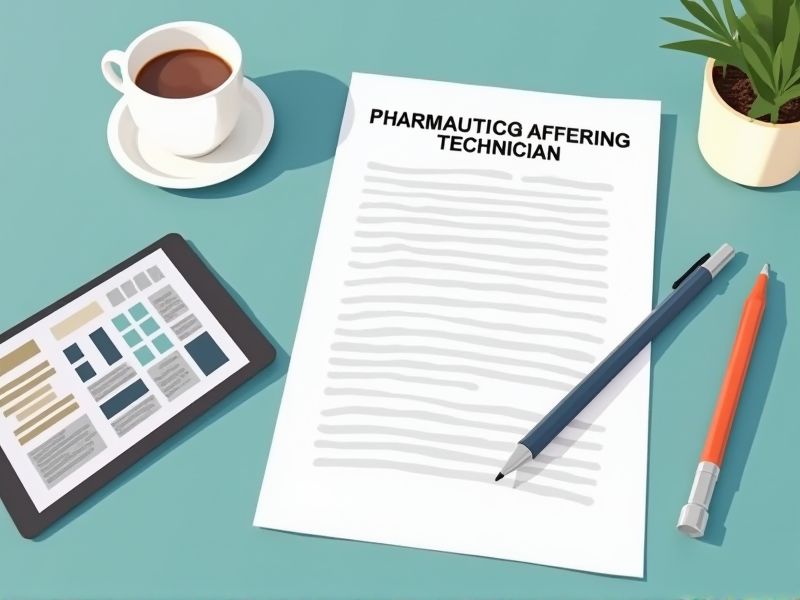
Pharmaceutical Manufacturing Technicians play a crucial role in ensuring the quality and safety of medications, necessitating specific certifications to uphold industry standards. These certifications provide technicians with critical knowledge in areas like Good Manufacturing Practices (GMP) and quality control, directly impacting product safety and efficacy. Regulatory compliance is a cornerstone for pharmaceutical companies, so these certifications are often mandatory to meet stringent industry regulations. Key certifications that may be essential for a Pharmaceutical Manufacturing Technician include those related to GMP, Safety, and Quality Control.
Good Manufacturing Practices (GMP) Certification
GMP Certification ensures that pharmaceutical products are consistently produced and controlled according to quality standards, reducing the risk of contamination and errors. With GMP, manufacturers can maintain compliance with regulatory requirements, which helps prevent legal issues and product recalls. Certification fosters trust among healthcare professionals and patients by verifying that products are safe and effective. Technicians, through GMP, enhance their professional credibility and competency in handling sensitive pharmaceutical processes.
Certified Pharmaceutical Technician (CPhT) Certification
Certified Pharmaceutical Technician (CPhT) Certification equips technicians with standardized knowledge crucial for maintaining quality in pharmaceutical manufacturing. It ensures individuals adhere to stringent safety protocols, reducing the risk of product contamination and errors. The certification enhances a technician's understanding of regulatory compliance, boosting their capacity to meet FDA standards. Employers often prioritize certified technicians, as it reflects a commitment to excellence and professional development.
OSHA 10-Hour Construction/General Industry Certification
Pharmaceutical manufacturing environments involve hazardous materials and equipment, which necessitates an understanding of safety protocols that the OSHA 10-Hour Construction/General Industry Certification provides. With this certification, technicians gain essential knowledge for identifying potential workplace hazards, ensuring a safer production environment. Compliance with OSHA standards is critical to minimize legal liabilities and adherence to industry regulations. Proper safety training can significantly reduce the risk of accidents and improve overall workplace efficiency in pharmaceutical manufacturing.
ISO 9001:2015 Fundamentals Certification
ISO 9001:2015 Fundamentals Certification ensures that a Pharmaceutical Manufacturing Technician understands the principles of quality management systems, which is crucial for maintaining consistent drug quality. This certification provides knowledge about risk management and process control, reducing the likelihood of production errors and ensuring compliance with regulatory standards. With this certification, technicians are better equipped to contribute to continuous improvement initiatives, enhancing operational efficiency. The certification demonstrates a technician's commitment to quality, making them more valuable to employers who prioritize safe and effective pharmaceutical production.
Lean Six Sigma Yellow Belt Certification
Lean Six Sigma Yellow Belt Certification equips Pharmaceutical Manufacturing Technicians with fundamental skills to enhance process efficiency and reduce waste. By understanding these principles, technicians can contribute to maintaining rigorous quality standards crucial in pharmaceutical production. The certification also fosters a culture of continuous improvement, crucial in a field where precision and quality are non-negotiable. Employers often favor candidates with such credentials, seeing them as equipped to drive operational excellence.
Hazardous Materials (HAZMAT) Handling Certification
Hazardous Materials (HAZMAT) Handling Certification is essential for pharmaceutical manufacturing technicians to ensure safe handling and disposal of potentially dangerous chemicals used in drug production. OSHA regulations necessitate such certification to minimize workplace accidents and exposure risks. Certification helps maintain compliance with health and safety standards, reducing potential legal liabilities for pharmaceutical companies. It enhances technicians' proficiency in using protective equipment, which minimizes the risk of contamination affecting drug quality.
Environmental Health and Safety (EHS) Certification
Pharmaceutical manufacturing involves working with hazardous chemicals, and an EHS Certification ensures technicians understand and implement safety protocols, reducing accidents. Proper understanding of environmental risks helps minimize contamination, thus ensuring product safety and efficacy. Regulatory bodies require stringent adherence to safety standards, making EHS Certification a necessity for compliance and operational continuity. Through certification, technicians contribute to sustainable practices, which helps in preserving natural resources and maintaining environmental balance.
Laboratory Safety Certification
A Pharmaceutical Manufacturing Technician requires laboratory safety certification due to the intricate handling of potentially hazardous substances. This certification ensures that technicians understand proper safety protocols, reducing risk of accidents or contamination. Proper certification also aligns with regulatory compliance, which is critical in maintaining the credibility of pharmaceutical companies. Enhanced safety measures directly contribute to the quality and efficacy of the pharmaceutical products produced.
Quality Assurance (QA) Certification
Quality Assurance (QA) Certification ensures that Pharmaceutical Manufacturing Technicians possess the necessary skills to maintain high standards of drug safety and efficacy. It acts as a standardized benchmark, reducing the risk of contamination and errors, which is crucial in safeguarding public health. Certification aligns with regulatory compliance, such as FDA guidelines, by ensuring professionals understand and apply industry best practices. Costly recalls and legal implications associated with quality failures are mitigated when technicians are certified and adhere to rigorous quality standards.
Basic Chemistry Certification
A Basic Chemistry Certification provides pharmaceutical manufacturing technicians with essential knowledge of chemical reactions, which is crucial for ensuring product safety and efficacy. Understanding basic chemical properties helps technicians accurately handle raw materials, reducing the risk of errors in drug formulation. Certification ensures that technicians possess the skills to maintain quality control standards in compliance with industry regulations. Knowledge of chemistry also aids in troubleshooting manufacturing issues, minimizing production downtime and maintaining efficiency.
Summary
By gaining certifications, you increase your understanding of advanced pharmaceutical manufacturing processes, enhancing your skills. Certifications lead to higher proficiency, making you more efficient and accurate in your role. This expertise often results in better job prospects and potential salary increases. With recognized certifications, your credibility and value in the pharmaceutical industry significantly rise.
